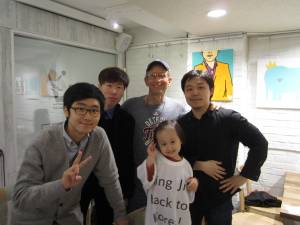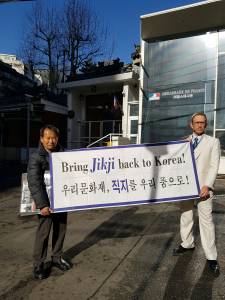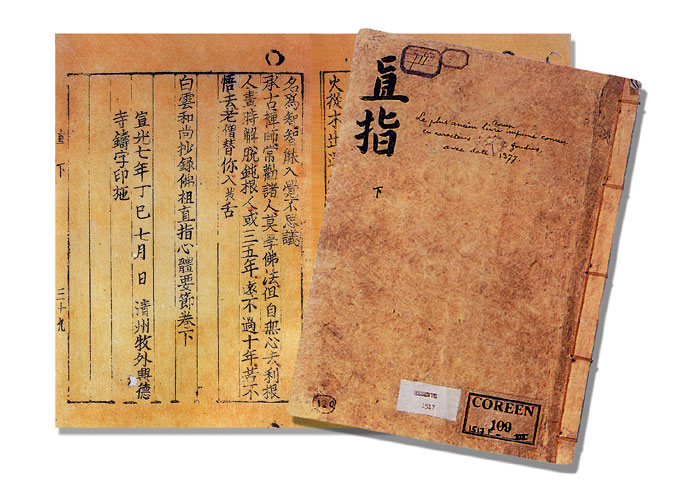[It’s a sad fact that my year-long effort to get Abner Haynes into the College Football Hall of Fame and my even longer drive to convince the French to put Jikji on a Seoul-bound airplane ended—unsuccessfully—within a couple of months of each other. What follows is an account of the little  ceremony we had outside the French Embassy in Seoul on a cold morning in the winter of 2017. I went there with Yong Yoon and Jane Jang. He spoke after me, and she served as our camera woman. The idea was that we would make a video and put it on You Tube, with Korean and English subtitles. No such video was ever made.]
ceremony we had outside the French Embassy in Seoul on a cold morning in the winter of 2017. I went there with Yong Yoon and Jane Jang. He spoke after me, and she served as our camera woman. The idea was that we would make a video and put it on You Tube, with Korean and English subtitles. No such video was ever made.]
This is Richard Pennington. I am here at the French Embassy with my colleague Yong Yoon. We, along with Cheol-Woong Rim, are the directors of the Committee to Bring Jikji Back to Korea, which began in the summer of 2013. Today, February 17, 2017, marks the official end of our campaignto persuade, compel or shame the government of France into repatriating this enormously valuable artifact. Jikji is the oldest extant document printed on movable metal type and thus tangible proof that the printing press was invented in East Asia, not Germany.
While the odds were never good that we would succeed and get Jikji back, we have tried. We have gathered about 7,500 names on our petition, which we had hoped to present to the French ambassador, Fabien Penone, whose office is directly behind me. The petition is written in Korean, French and English.  Let me read you the English portion: “We, the undersigned, respectfully ask the National Library of France to return Baegun hwasang chorok buljo jikji simche yojeol (‘Jikji’) to Korea. Jikji was written by a Korean and produced in 1377 by Korean artisans using the radically new technology of movable metal type. Just over a century ago, it was taken out of the country by a Frenchman under dubious circumstances. We believe the time has come to bring Jikji back home. It is right and proper that this priceless document—recognized by UNESCO, historians and cultural anthropologists from both East and West—be housed and displayed in the National Museum of Korea.”
Let me read you the English portion: “We, the undersigned, respectfully ask the National Library of France to return Baegun hwasang chorok buljo jikji simche yojeol (‘Jikji’) to Korea. Jikji was written by a Korean and produced in 1377 by Korean artisans using the radically new technology of movable metal type. Just over a century ago, it was taken out of the country by a Frenchman under dubious circumstances. We believe the time has come to bring Jikji back home. It is right and proper that this priceless document—recognized by UNESCO, historians and cultural anthropologists from both East and West—be housed and displayed in the National Museum of Korea.”
Despite numerous letters and e-mails, Monsieur Penone has chosen not to let us in. We have also written to the president of France, the minister of culture, the editor of Le Monde, people at UNESCO (which is based in Paris), the Korean ambassador to Franceand the director of the National Library of France, where Jikji is held.
Closer to home, we have been featured on television, radio, newspapers and magazines. We have made videos and been on podcasts at LBC, headquarters of the Jikji-return movement.We have created an educational cartoon entitled “The Amazing 640-year History of Jikji.” We have been in contact with academics and people at historical foundations, we have met witha member of the National Assembly and with representatives of the Cultural Heritage Administration three times. We have written to Korean students attending more than 100 American, Canadian and British universities. We have unsuccessfully sought a meeting with the president at the Blue House. We made noise at the Jikji Festival in Cheongju in 2013 and in 2016. (Cheongju, of course, is where Jikji was printed in 1377.) We have given speeches and done everything in our power to get our point across—Jikji has to come back to Korea, as soon as possible and no strings attached.
The stubborn attitude of the ambassador is indicative, as the French show no sign of loosening their grip on Jikji, and the Korean government does not seem inclined to put this on the diplomatic agenda. You could say we have failed in our quest, but we have done our best. We have made Jikji a public issue unlike ever before. Perhaps in a few years, some other group will come along and take up the cause.
I will now turn it over to Mr. Yoon.
* * *
 Mr. Richard Pennington has been engaged in Jikji return activities for almost four years. He has asked the French government to return it because it is originally from Korea and was printed 200 years before Gutenberg. Unfortunately, neither the French government nor the Korean government has answered. He is so disappointed.
Mr. Richard Pennington has been engaged in Jikji return activities for almost four years. He has asked the French government to return it because it is originally from Korea and was printed 200 years before Gutenberg. Unfortunately, neither the French government nor the Korean government has answered. He is so disappointed.
He is an American. No Korean has ever tried as much as Mr. Pennington has. It’s a shame. So he has come to the conclusion that it’s time to wrap up the Jikji campaign. That’s why we are here. France says that Jikji was purchased in 1887 by Victor Collin de Plancy from a Korean. Well, there is no evidence that it was purchased. I think it could have been taken forcefully or in some other improper way. Anyhow, the French government should return Jikji immediately.


Add Comment